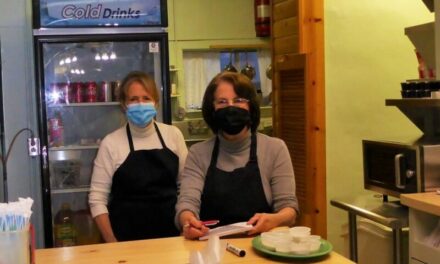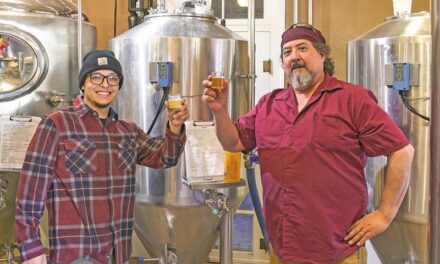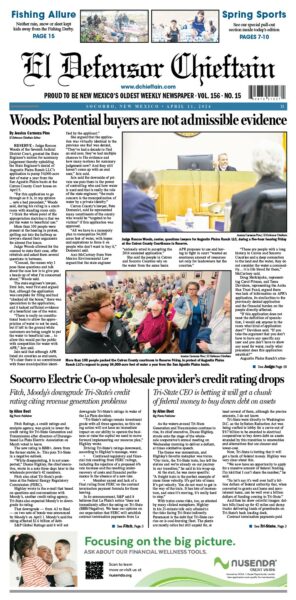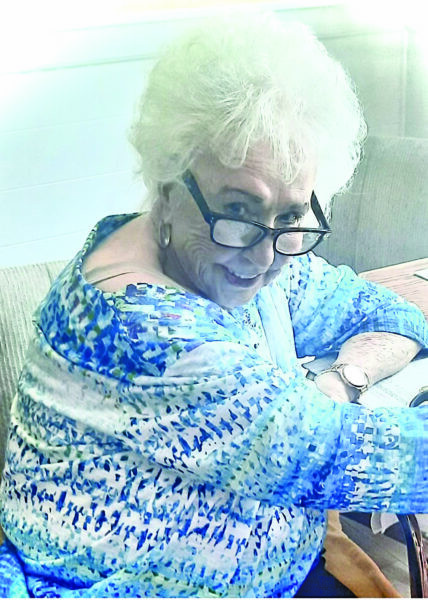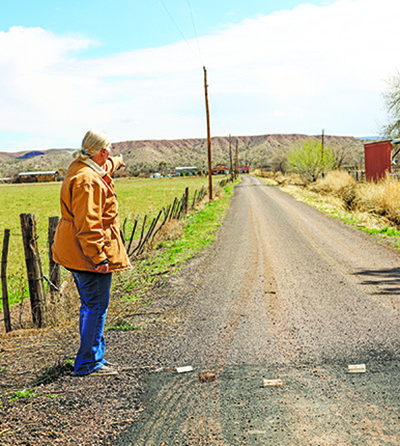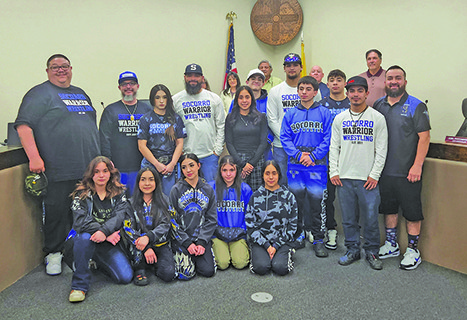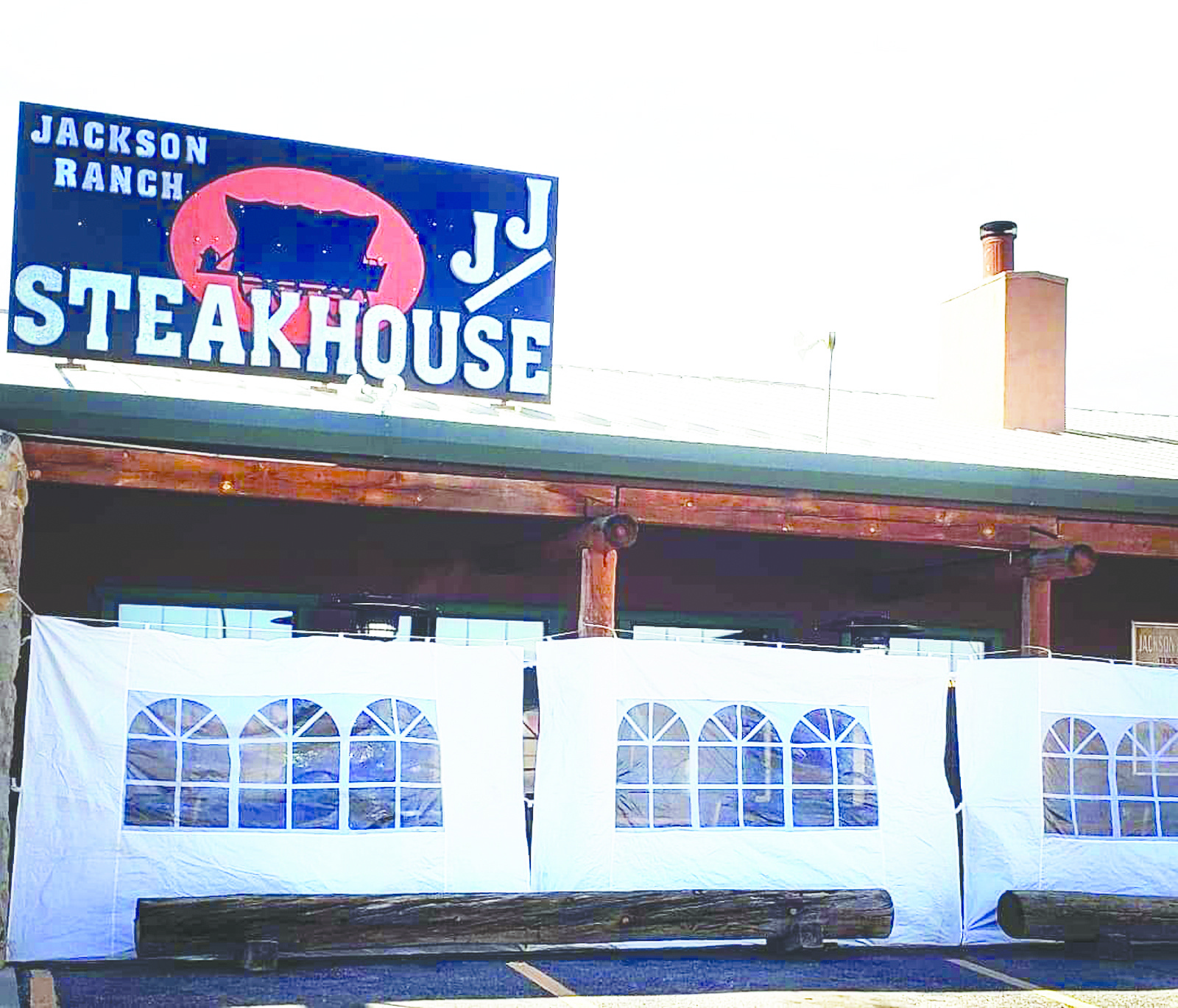
Jackson Ranch Steakhouse put up shields to block the wind as customers dine outside due to the COVID-19 pandemic. Currently, customers are not allowed to dine indoors.
Courtesy of Thomas Jackson
When Thomas Jackson opened the Jackson Ranch Steakhouse on Dec. 1, 2018, he never imagined he would have to take out loans to stay in business.
“I opened this business without borrowing a single penny,” he said. “I bought the building. I started the business. I financed everything myself. I didn’t borrow. No debt on it. Now, I’m sitting here trying to figure out what to do.”
Throughout the COVID-19 pandemic, Jackson has struggled financially to make ends meet and has been granted PPP loans. He said one issue he is finding with the PPP loan is that a restaurant can apply for forgiveness, but it is not a guarantee that it will be forgiven.
“Offering me a loan to stay in business is ridiculous when I started the business without a loan,” Jackson said. “I have to go into debt to stay in business because the state is telling me that I can’t be open.”
For Jackson, without the PPP loans, he would not have been able to keep all of his 10 current employees on as all of that money went to paying their salaries and wages.
Prior to COVID-19, Jackson said he had 22 employees and had to cut that to the 10 they have now.
“We have a lot of money invested in training employees,” he said. “They have families and stuff too and I care about them, their families. We are like a family here. It’s been hard.”
When Socorro was labeled as yellow, Jackson said he asked the 10 employees if any of them wanted to take time off or want to go down to part-time because he does not want to lose any of his staff. He said all of his employees chose part-time.
While Jackson has been able to keep all of his current employees, other restaurants have not been as lucky.
Deborah Dean of Bodega Burger Co., Janice Baca Argabright of The Owl Bar and Cafe and Zooila Armijo of San Antonio Cafe have had to lay off workers.
Argabright said she has been unable to bring back her cashier, but was able to call back the dishwasher and three servers for the two weeks the county was yellow.
During those two weeks, she said she was making some good deposits and that the restaurant was starting to rebound. Argabright said while it helps they are an established business, she has roughly seen a 42 percent decrease financially throughout the pandemic.
“We’ve had our clientele and people who come all the time,” she said. “I feel sorry for some of these newer restaurants that haven’t been in business for that long and have gone under. We are hanging in there. I’ve been able to pay the bills. Pay the workers that I have. No profit or paycheck for me.”
Armijo and Dean said they are laying off staff and then bringing them back as the county changes between red and yellow or as they are allowed to have more customers for in-person dining. They both have had to open up job applications because some employees who were called back said they found a job in a different field due to the uncertainty of when they would have work.
“Some more challenges we are seeing now is we are trying to hire because we don’t have enough staff to jump in with both feet,” Dean said. “People are not applying to jobs. That is why our takeout is only Monday through Friday so that our guys can get some time off.”
Dean said the restaurant will “keep plugging away for as long as we can” as they have gone through the restaurant’s savings account due to having to pay bills and not having any income.
“We are constantly pulling that money out of the savings account, out of our own personal savings to cover all of that,” she said. “It’s been almost a year so it’s getting very tiring because you can only pull so much out of your own personal savings account and be able to live.”
For Armijo, her biggest financial challenge is being able to make money while being capped at 25 percent for indoor dining when it is allowed. With how tiny her restaurant is, she can only have six people dining indoors at a time.
“We’ve had a lot of customers angry at us, which it’s not our fault,” she said. “We’ve had customers who haven’t come back. I’ve had customers throw things at us. I’ve had customers who refused to wear a mask and I had to ask them to leave. It’s a never-ending thing.”
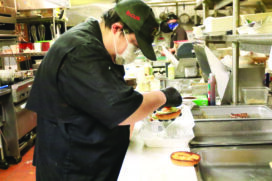
Alex Gomez, who is a cook at Bodega Burger Co., puts the garnish on top of a hamburger bun prior to placing it into a to-go box.
Caitie Ihrig | El Defensor Chieftain
Due to the financial challenges and the treatment Armijo and her workers receive from some customers, there are days she thinks about closing San Antonio Crane.
“I understand why businesses have closed,” she said. “I understand it completely. It’s been a thought in my head a time or two. I won’t do it. Some days, you wake up and you’re like, ‘this is it.’ You watch the news or hear what is happening. A lot of these businesses didn’t close because there was no business. A lot of businesses had to close because they didn’t have help.”
Armijo said having outdoor dining has helped, but due to the cold front that recently came through, she had to resort to having takeout only.
Montano Pettis of Golden Spur and Jackson said their restaurants also shutdown for takeout only due to the cold.
“It was a bummer because we only had two weeks open and right before this cold front comes in, they tell us we have to go back to 25 percent out on the patio which no one is going to be on the patio right now,” Pettis said.
The Owl Bar and Cafe along with Bodega Burger Co., were granted PPP loans to help cover their current bills and to make up for the loss of not having in-person dining. Golden Spur is one local restaurant that was unable to get the PPP loan.
Pettis said the restaurant missed receiving the loan by 1 percent.
“There’s nothing you can do about it,” he said. “We still have a business to run so we just do the best we can with what we got.”
Argabright said the money has gone towards the rent, liquor license and paying her workers.
For Bodega, the money helped a lot as Dean said having only take-out barely covers the food costs. She said they are not currently doing outdoor dining because they would have to walk customers through the whole main part of the restaurant to get to the patio. She said it has been very difficult to order food during the pandemic as it is a guessing game as to what days will be slow and what days will be busy.
Jackson said it feels as if he is learning everything all over again. The first year Jackson Ranch Steakhouse was in business consisted of gaining a constant customer base and figuring everything out. For him, the start of the second year was going very well until the start of the pandemic.
“It almost feels as if we are starting all over again,” he said. “The first year you learn how much you need to order, when your busy days are, when your slow days are, your busy times of the year and slow times. Now, with COVID-19, there is no prediction on it. You can’t predict if it’s going to be a slow day, a busy day. Everyday is like a new thing… it’s thrown a curveball into it.”
An even bigger curveball was thrown into the mix in the middle of February: Valentine’s Day.
Armijo, Dean and Jackson ordered food in preparation to be open Valentine’s Day weekend for in-person dining.
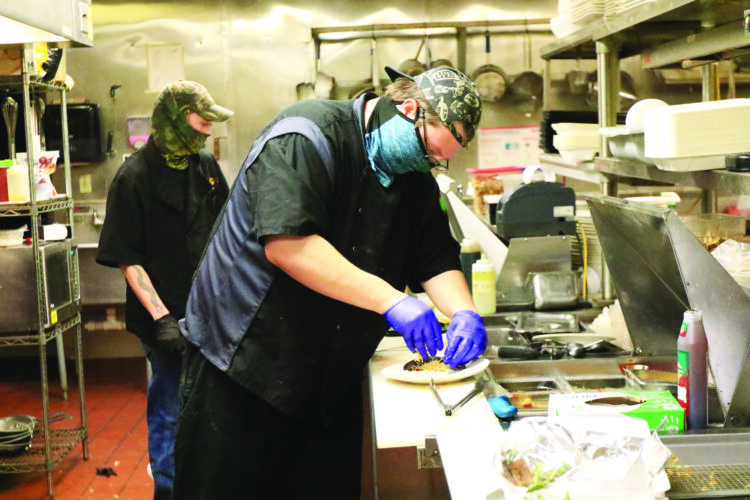
Shawn Leaf makes an Enchilada for a customer at Bodega Burger Co. on Thursday, Feb. 18.
Caitie Ihrig | El Defensor Chieftain
For Armijo, she said she is planning on running specials to get rid of the food so that there’s not a bigger financial loss. Armijo said she has a refrigerator full of food and that “there is just so much you can put in your freezer too.”
At Bodega, Dean said after placing her Valentine’s Day order and then finding out the following day the county was going back to red, she immediately had to cut back the next order.
The restaurant was going to be open on Saturday instead of Sunday for Valentine’s Day and Dean said their reservations sold out.
“We tried our best to contact all our people that had reservations to let them know that we were not open for dine in, but we encouraged them to do takeout and a lot of them did to support us more than anything us,” she said. “I think they really just wanted to support the restaurant business so they did take out. They could have easily gone to Albuquerque because Albuquerque opened up over the weekend.”
Jackson said he ordered $8,000 worth of food a few hours before finding out the county was going back to red.
“I probably wouldn’t have put it in,” he said. “No one calls you. You could wait, but if you wait until 3 p.m. to find out, all of our ordering has to be in by 4 p.m. because that is the cutoff. It’s last minute. This every two weeks thing and not giving the businesses a heads up on what is happening is ridiculous.”
All four restaurants say they rely on Facebook, word-of-mouth or watching the news to find out what color the county will be for the following two weeks.
“They don’t send us an email or nothing like that,” Pettis said. “We have to watch the darn news every morning and see what color we are. It’s a pain in the butt. They don’t have a very good system in place for letting the small businesses know what we are doing. It’s pretty frustrating.”
Dean said it would be very helpful if the Department of Health or the Alcohol and Gaming division would send out a mass email to the restaurants in each county stating what color the county will be and what that means. She also doesn’t know when the restaurant has to be closed by for in-person dining when a county goes back to red.
“It’s not clear at what time does that clock start ticking,” she said. “We know we have 48 hours. Is it 1 p.m.? 3 p.m.? Is it the next day that the clock starts ticking? Nobody knows.”
According to Dean and Jackson, the DOH is constantly sending them emails regarding sanitation practices, inspections and COVID-safe protocols.
Since the pandemic started, all four restaurants have been sanitizing, even more, to make sure their restaurants are as clean as they can be.
Jackson said his extra staff are in charge of constantly cleaning, including taking out the booths and tables to clean those areas. Each morning the staff deep cleans the whole restaurant and everything is sanitized at least once an hour. They also have a sign-in book for contact tracing in case there is a COVID-19 case.
Argabright said each position has a separate cleaning checklist that must be completed multiple times throughout the day. The cooks are in charge of sanitizing their areas every two hours with Clorox wipes and the servers are in charge of cleaning the main part of the restaurant.
At San Antonio Crane, the whole restaurant is cleaned after breakfast, lunch and dinner, respectively. After a customer leaves, their table and everything they may have touched is sanitized before another customer is seated.
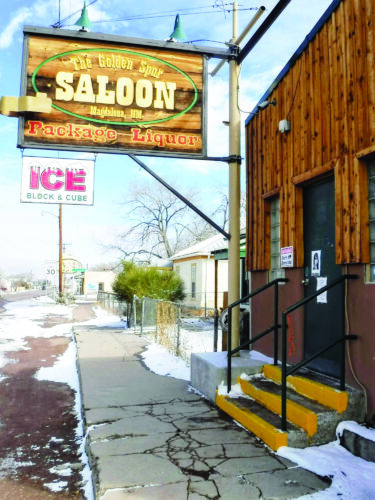
Golden Spur is a restaurant in Magdalena that has been impacted by the COVID-19 pandemic.
John Larson | El Defensor Chieftain
“We just try so hard because we definitely don’t want to be on that mark where it came from here or we got someone sick or even ourselves,” Armijo said. “We don’t want to go home and take it to our kids, our parents, our grandparents. We don’t want to do that. We are all up for everyone’s safety. And we wear our masks and we require all of our customers to wear masks.”
At Golden Spur, Pettis said they have their tables set up where no more than five can be seated together along with social distancing measurements marked out.
While no more than five people can sit together due to the current state orders, Argabright said she saw people with smiles on their faces and just enjoying eating at a restaurant.
They were so happy,” she said. “It was nice to see happy faces eating and laughing and enjoying themselves. They didn’t want to leave. They would say, ‘we are staying here for two hours because we want to enjoy eating in. We haven’t eaten-in in a year. We are going to do it.’”
During the two weeks of indoor dining, Pettis said it helped the financials at Golden Spur a lot and that people just want to get out again. He said going back to 25 percent on the patio and at times only having takeout did “absolutely nothing but hurt us.”
“I know there is a fine line between being safe and going back to normal, but we are doing every precaution we can possibly do,” Pettis said. “We’ve passed every environmental health test, every state cop visit. Everything they’ve thrown at us, we’ve passed with flying colors. Our small business gets slapped in the face again. Just trying to do everything we can to be open. It’s kind of rough.”





